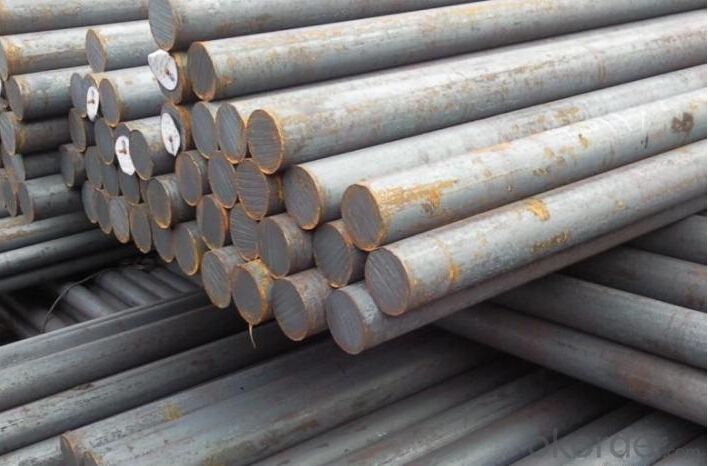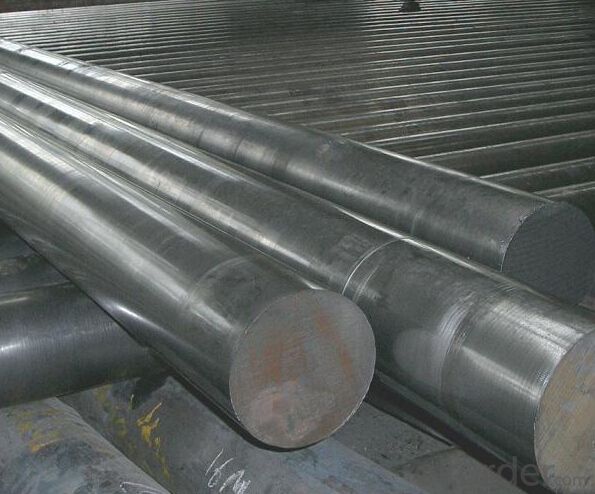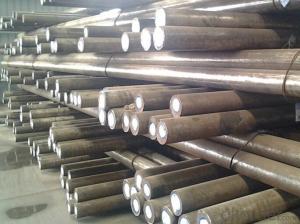Grade DIN41C4 alloy steel round bars Hot Rolled
- Loading Port:
- Tianjin
- Payment Terms:
- TT OR LC
- Min Order Qty:
- 3 m.t.
- Supply Capability:
- 10000 m.t./month
OKorder Service Pledge
OKorder Financial Service
You Might Also Like
Item specifice
Product Description:
1. Commodity: Round steel bar
2. Technical: Hot rolling
3. Length: Min. 5.8meter, according to requirement.
4.Diameter: 16mm-250mm
OKorder is offering Grade 41Cr4 alloy steel round bar at great prices with worldwide shipping. Our supplier is a quality manufacturer of steel, with our products utilized the world over. OKorder annually supplies products to European, North American,African and Asian markets..etd. We will quote you our most competitive prices within 24 hours after received the inquiry and guarantee the quality.
Product Applications:
Grade DIN41Cr4 Alloy steel round bar are ideal for structural applications and are widely used in the
Gear, Sleevesspool,Shaft, Crankshaft, Pin,Gear, Sleevesspool,Shaft, Crankshaft, Pin
Product Advantages:
OKorder's Grade DIN41Cr4 alloy steel are durable, strong, and resist corrosion.
Chemical Composition
Grade | C | Si | Mn | Cr | Ni | Cu | P | S |
40Cr | 0.37-0.44 | 0.17-0.37 | 0.50-0.80 | 0.80-1.10 | ≤0.30 | ≤0030 | ≤0.035 | ≤0.035 |
41Cr4 | 0.38-0.45 | ≤0.40 | 0.60-0.90 | 0.90-1.20 | ≤0.030 | ≤0.030 | ≤0.035 | ≤0.035 |
5140 | 0.38-0.43 | 0.17-0.37 | 0.70-0.90 | 0.70-0.90 | ≤0.030 | ≤0.030 | ≤0.040 | ≤0.035 |
Mechanical Properties
Grade | Tensile Strengthσb (MPa) | Yield Strength | Elongation | Reduction of Area ψ (%) | Impact Akv(J) | Hardness |
|
| |||||
σs (MPa) | δ5 (%) | |||||
41Cr4 | ≥980(100) | ≥785(80) | ≥9 | ≥45 | ≥47 | ≤207HB |
Packaging & Delivery
Standard seaworthy packing or as customer required
Leadtime
Delivery time: Within 30 days after order is confirmed.


- Q:What are the different applications of tool special steel?
- Tool special steel is a versatile material with unique properties that finds applications in various industries. Some of the diverse uses of this steel include: 1. Cutting Tools: In the manufacturing of drills, saw blades, milling cutters, and lathe tools, tool special steel is widely employed. Its exceptional hardness, wear resistance, and toughness ensure long tool life and superior cutting performance. 2. Dies and Molds: Tool special steel is extensively used in the production of dies and molds for metalworking and plastic injection molding processes. It is suitable for these demanding applications due to its ability to withstand high temperatures, resist wear and deformation, and maintain dimensional stability. 3. Automotive Industry: Tool special steel is employed in the automotive industry for various components such as crankshafts, gears, camshafts, and engine valves. Its outstanding strength, fatigue resistance, and heat resistance qualities contribute to the overall durability and performance of automotive parts. 4. Aerospace Industry: The aerospace industry utilizes tool special steel for applications such as turbine blades, aircraft engine components, landing gears, and structural parts. Its high strength, corrosion resistance, and ability to withstand extreme temperatures and pressure make it an ideal choice for these critical applications. 5. Construction and Mining: In the construction and mining sectors, tool special steel is used for equipment like excavator buckets, rock drills, bulldozer blades, and drilling bits. Its remarkable hardness, toughness, and resistance to abrasion enable these tools to withstand the harsh conditions encountered in these industries. 6. Tooling Industry: In the tooling industry, tool special steel is extensively employed in the manufacture of various types of tools and equipment. Hand tools, power tools, and precision instruments all benefit from the exceptional strength, hardness, and resistance to wear and deformation of tool special steel. 7. Medical Industry: In the medical field, tool special steel is utilized for the production of surgical instruments, orthopedic implants, and dental tools. Its biocompatibility, corrosion resistance, and ability to be sterilized make it suitable for these critical applications. These examples highlight the numerous applications of tool special steel. Its unique properties make it a valuable material in various industries where durability, strength, and precision are essential requirements.
- Q:How is free-cutting steel used in the manufacturing of screws and bolts?
- Free-cutting steel is used in the manufacturing of screws and bolts because of its excellent machinability. It contains additives such as sulfur, lead, or bismuth that improve its ability to be easily and efficiently shaped into the desired form. This type of steel enables manufacturers to produce screws and bolts with intricate threading and precise dimensions, resulting in high-quality and reliable fasteners.
- Q:Is special steel resistant to chemical corrosion?
- Yes, special steel is generally resistant to chemical corrosion. Special steel, also known as stainless steel, is a type of alloy that contains a minimum of 10.5% chromium. The addition of chromium in the steel composition forms a passive oxide layer on the surface, which acts as a protective barrier against corrosion. This oxide layer is highly stable and prevents the steel from reacting with various chemicals and corrosive substances. Additionally, special steel may also contain other alloying elements such as nickel, molybdenum, and titanium, which further enhance its resistance to chemical corrosion. These elements increase the steel's ability to withstand exposure to acids, alkalis, salts, and other corrosive agents commonly found in industrial and environmental settings. However, it is important to note that the resistance of special steel to chemical corrosion may vary depending on the specific grade and composition. Different grades of stainless steel offer different levels of corrosion resistance, and it is crucial to select the appropriate grade based on the intended application and the specific corrosive environment. In summary, while special steel is generally resistant to chemical corrosion, the specific resistance can vary depending on the grade and composition. Therefore, it is essential to consider the specific requirements and consult with experts to choose the most suitable special steel for a particular application.
- Q:How does special steel contribute to the oil and gas aftermarket industry?
- Due to its unique properties and capabilities, special steel plays a vital role in the oil and gas aftermarket industry. Its resistance to corrosion makes it well-suited for use in the harsh and corrosive environments commonly found in this sector. By preventing corrosion, special steel extends the lifespan of equipment and components, reducing the need for frequent replacements and maintenance. Additionally, special steel offers high strength and durability, enabling it to withstand the extreme pressures and temperatures encountered in oil and gas operations. This strength ensures that equipment and components made from special steel can function reliably and efficiently, even under demanding conditions. Moreover, special steel can be customized to meet the specific requirements of the oil and gas industry. With its various grades and compositions, special steel can possess specific properties, such as resistance to sulfide stress cracking, hydrogen embrittlement, and high-temperature oxidation. These tailored properties make special steel suitable for critical applications, including wellheads, pipelines, valves, and other equipment used in the oil and gas aftermarket industry. Furthermore, special steel allows for the production of complex and intricate components that are essential for the oil and gas sector. Its excellent machinability and weldability enable the creation of precision-engineered parts, ensuring the efficient and reliable operation of oil and gas equipment. In conclusion, special steel plays a significant role in the oil and gas aftermarket industry by providing corrosion resistance, high strength, durability, customization options, and the ability to manufacture intricate components. These properties make special steel indispensable in ensuring the safety, reliability, and efficiency of operations in the oil and gas sector.
- Q:What are the different case hardening grades of special steel?
- There are several different case hardening grades of special steel, each with its own unique properties and applications. Some of the most commonly used case hardening grades include: 1. 8620: This grade of steel is commonly used for gears, shafts, and other high-stress applications. It has excellent toughness and wear resistance, making it ideal for parts that require both strength and durability. 2. 9310: This grade is often used for aerospace applications due to its high strength and resistance to fatigue. It is commonly used for gears, bearings, and other components that require exceptional toughness and load-carrying capacity. 3. 4340: This grade is known for its high strength and hardenability. It is commonly used for parts that require high tensile strength and good impact resistance, such as crankshafts, connecting rods, and gears. 4. 20MnCr5: This grade is often used in the manufacturing of gears, camshafts, and other components that require high surface hardness and wear resistance. It is known for its excellent case-hardening properties and good core strength. 5. EN36C: Also known as 655M13, this grade is frequently used for making components that require high tensile strength, such as axles, shafts, and crankshafts. It has good hardenability and excellent toughness, making it suitable for heavy-duty applications. It is important to select the appropriate case hardening grade based on the specific application requirements, such as desired hardness, strength, and wear resistance. Consulting with a metallurgist or an expert in materials science can help ensure the right grade is chosen for a particular project.
- Q:How does special steel contribute to improving product performance in corrosive environments?
- Special steel contributes to improving product performance in corrosive environments due to its exceptional corrosion resistance properties. It is specifically designed to withstand exposure to harsh chemicals, moisture, and other corrosive elements, thus preventing the degradation and deterioration of the product. By using special steel, manufacturers can ensure longer product lifespans, increased durability, and reduced maintenance costs, ultimately leading to improved performance and customer satisfaction in corrosive environments.
- Q:What are the specific requirements for special steel used in the nuclear waste storage industry?
- The nuclear waste storage industry has stringent and critical requirements for special steel to guarantee the safety and long-term viability of storage facilities. These requirements are driven primarily by the need to mitigate risks associated with nuclear waste, such as radiation leakage and corrosion. One key requirement is the need for high strength and durability. Special steel used in nuclear waste storage must possess exceptional mechanical properties to withstand the weight and pressure exerted by waste containers and the surrounding environment. This includes resistance to deformation, fracture, and fatigue, as well as the ability to maintain structural integrity for an extended period. Another essential requirement is excellent corrosion resistance. Nuclear waste contains highly corrosive substances that can degrade regular steel over time. Therefore, special steel used in the nuclear waste storage industry must have enhanced corrosion resistance to ensure long-term durability and prevent leakage of radioactive materials. Furthermore, the steel must have a low susceptibility to stress corrosion cracking (SCC). SCC occurs when a combination of tensile stress, corrosive environment, and specific material conditions result in crack initiation and propagation. To maintain the integrity of containers and minimize the risk of leakage, the steel used must be highly resistant to SCC. Radiation resistance is also critical for special steel used in nuclear waste storage. The steel should exhibit minimal degradation or embrittlement when exposed to high levels of radiation. This is necessary to maintain the structural integrity of storage containers and prevent any weakening that could compromise waste containment. In addition, the special steel used in the nuclear waste storage industry must comply with strict regulatory standards and certifications. It must meet specific design codes and guidelines set by regulatory authorities to ensure compliance with safety regulations and minimize potential hazards. In conclusion, the special steel used in the nuclear waste storage industry must meet specific requirements, including high strength, durability, corrosion resistance, low susceptibility to stress corrosion cracking, radiation resistance, and compliance with regulatory standards. These requirements are essential for maintaining the safety and integrity of storage facilities and preventing any leakage or release of radioactive materials into the environment.
- Q:What are the different methods of protecting special steel against corrosion?
- There exists a variety of techniques for safeguarding special steel from corrosion. Some commonly employed methods are as follows: 1. Application of Coatings: One of the most efficient approaches to prevent corrosion is to apply a protective coating onto the steel surface. This can be accomplished using diverse techniques like hot-dip galvanization, electroplating, or painting. The coatings act as a barrier, effectively preventing moisture and corrosive substances from coming into contact with the steel. 2. Utilization of Cathodic Protection: This method involves the use of either a sacrificial anode or an impressed current to shield the steel. In sacrificial anode cathodic protection, a more reactive metal is connected to the steel, thereby causing the sacrificial metal to corrode instead of the steel. Conversely, impressed current cathodic protection employs an external power source to provide a continuous flow of electrons, thus halting the corrosion process. 3. Alloying: The addition of specific elements to special steel can enhance its resistance against corrosion. For instance, stainless steel contains chromium, which forms a passive oxide layer on the surface, providing protection against corrosion. Likewise, the inclusion of elements like nickel, molybdenum, or copper can improve the steel's resistance to corrosion. 4. Passivation: Passivation is a chemical process that involves treating the steel with an acid solution to eliminate any impurities present on the surface. This process facilitates the formation of a protective oxide layer, thereby preventing further corrosion. 5. Use of VCI (Volatile Corrosion Inhibitors): VCI compounds are chemicals that emit vapors, forming a protective layer on the steel surface. This layer acts as a barrier, effectively safeguarding the steel against moisture and corrosive substances, thereby preventing corrosion. 6. Proper Maintenance and Cleaning: Regular maintenance and cleaning of the steel surface can significantly prolong its lifespan and prevent corrosion. By eliminating dirt, debris, and corrosive substances from the surface, the likelihood of corrosion is greatly reduced. It is essential to note that the selection of the appropriate method relies on various factors, such as the type of steel, the environmental conditions it will be exposed to, and the expected lifespan. Seeking guidance from corrosion experts or engineers can aid in determining the most suitable method for protecting special steel against corrosion.
- Q:How are titanium alloys used in the medical industry?
- Titanium alloys are widely used in the medical industry due to their excellent biocompatibility, corrosion resistance, and high strength-to-weight ratio. These alloys are used for various medical applications such as implants, surgical instruments, and medical equipment. They are often used in orthopedic implants, dental implants, and cardiovascular devices, as they provide long-term stability and compatibility with the human body. Additionally, titanium alloys are highly resistant to bodily fluids and can withstand harsh sterilization processes, making them ideal for use in the medical field.
- Q:How does special steel contribute to improving product quality?
- Special steel contributes to improving product quality in several ways. Firstly, it offers superior strength and durability compared to regular steel, making it ideal for applications that require high performance and reliability. This ensures that products made with special steel will have a longer lifespan and reduced chances of failure, thereby enhancing overall quality. Additionally, special steel can be tailored to have specific properties like corrosion resistance, heat resistance, or magnetic properties, which are crucial in various industries such as automotive, aerospace, and medical. By using special steel, manufacturers can produce products that meet specific performance requirements, resulting in improved quality and customer satisfaction.
1. Manufacturer Overview |
|
|---|---|
| Location | |
| Year Established | |
| Annual Output Value | |
| Main Markets | |
| Company Certifications | |
2. Manufacturer Certificates |
|
|---|---|
| a) Certification Name | |
| Range | |
| Reference | |
| Validity Period | |
3. Manufacturer Capability |
|
|---|---|
| a)Trade Capacity | |
| Nearest Port | |
| Export Percentage | |
| No.of Employees in Trade Department | |
| Language Spoken: | |
| b)Factory Information | |
| Factory Size: | |
| No. of Production Lines | |
| Contract Manufacturing | |
| Product Price Range | |
Send your message to us
Grade DIN41C4 alloy steel round bars Hot Rolled
- Loading Port:
- Tianjin
- Payment Terms:
- TT OR LC
- Min Order Qty:
- 3 m.t.
- Supply Capability:
- 10000 m.t./month
OKorder Service Pledge
OKorder Financial Service
Similar products
New products
Hot products
Related keywords




























